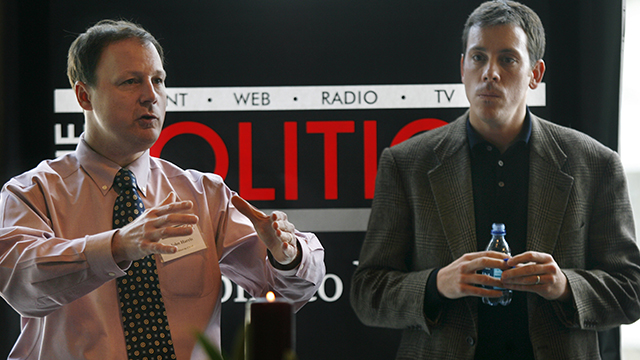Politico’s mission is to “drive” conversation in the capital—“drive” being a higher-velocity version than the stodgier verb “influence.” If, say, David S. Broder and R. W. Apple Jr. were said to “influence the political discourse” through the Washington Post and the New York Times in the last decades of the twentieth century, Politico wanted to “drive the conversation” in the new-media landscape of the twenty-first. The target audience is the “insiders” and “opinion makers” with no pretense of being representative of the population at large.

Politico’s chief franchise is Playbook, an online tip sheet delivered mostly via e-mail that has become a more influential morning document than the Note was in the early to middle 2000s. Written and sent out 365 days a year by the hyperactive and nocturnal Eagle Scout Mike Allen, Playbook is an insider’s dog’s breakfast of overnight news, press release previews, random sightings around town, and birthday greetings to people you’ve never heard of. These are “data points,” as Allen calls his dawn offering—the business of the nation in the form and voice of a summer camp newsletter. It reaches a target audience of what Politico calls “influentials”: elected officials, political operatives, lobbyists, journalists, and other political-media functionaries. This is the expanded Club or entourage of contemporary Washington—“the Playbook community,” in the words of Allen, who, around early 2009, many White House officials, members of Congress, staffers, and journalists began describing as the most influential journalist working in Washington today.
Politico is an organization of healthy self-regard. Company higher-ups tout Allen as not just its franchise player but something greater. Fred Ryan, a former Reagan administration official who is Politico’s CEO, told me that Allen will go down as a momentous figure in the annals of American journalism. “In the same way that Murrow was with one era and Walter Cronkite was with another era,” Ryan said, “I think Mike Allen is going to be viewed as one of the defining journalists of this period.”
Playbook’s success is emblematic of modern life in a timestarved place in which the power-and-information hierarchy has been upended. It also offers daily fodder for those who deride Washington as a clubby little town in which usual suspects talk to the same usual suspects all day.
A big part of Allen’s appeal, I’m convinced, is the volume of names he mentions. He will sometimes list more than a dozen birthdays alone on a given morning, which he will cull from Facebook, news sources, and his enormous word-of-mouth/e-mail network. He parcels out simple recognitions, fossil fuel to the Washington ego.
At any given time, the city is filled with formers and has-beens whom we might charitably describe as “still kicking around town.” Allen, with his mentions, gives a warm tingle of notice. The acknowledgment section of Terry McAuliffe’s memoir runs six single- spaced pages and includes the names of every member of the Democratic National Committee during his time as the party’s chairman. The index runs several more pages, making it a perfect vehicle for “the Washington read,” defined as the practice of “reading” books by scouring the index and acknowledgments for the Holy Grail, aka your name. (New York Times columnist David Brooks has an alternative definition of “Washington read”: the act of telling someone, “I didn’t read your book but did praise it on TV.”)
“There is no sweeter word in Washington than your own name,” said Marshall Wittmann, then a top aide to Senator Joe Lieberman and one of the great career vagabonds, ideological contortionists, and political pontificators ever to inflict himself on a city full of them. Wittmann is a Trotskyite turned Zionist turned Reaganite turned bipartisan irritant turned pretty much everything in between— including chief lobbyist for the Christian Coalition, the only Jew who has ever held that position. After leaving Lieberman’s office upon the senator’s announced retirement in 2012, Marshall became the top flack for the American Israel Public Affairs Committee (AIPAC).
Marshall was raised in Waco, Texas, worked for Cesar Chavez in the 1970s, Linda Chavez (a Republican Senate candidate from Maryland) in the 1980s, Ralph Reed of the Christian Coalition in the 1990s, and Bruce Reed of the centrist Democratic Leadership Council in the 2000s. Above all, Wittmann reveres his many political heroes. They include Teddy Roosevelt, Kinky Friedman, and his two most recent patrons, Lieberman and John McCain.
Washington, Marshall says, is all about having a shtick and a role and an ability to hone them in a way that builds a brand. Seeing and hearing your name is an important part of this. It conjures a split second of mindshare. Mike Allen is the local king of mindshare. He doles out morsels of proof that your brand is ticking, that your name is out there, that you’re alive in This Town.
Don’t miss Bill’s interview with Mark Leibovich on glitz and greed in the nation’s capitol »
| Mark Leibovich is the author of This Town and the chief national correspondent for The New York Times Magazine, based in Washington, D.C. He is well-known for his substantive and revealing profiles of politicians and media figures. More » |


